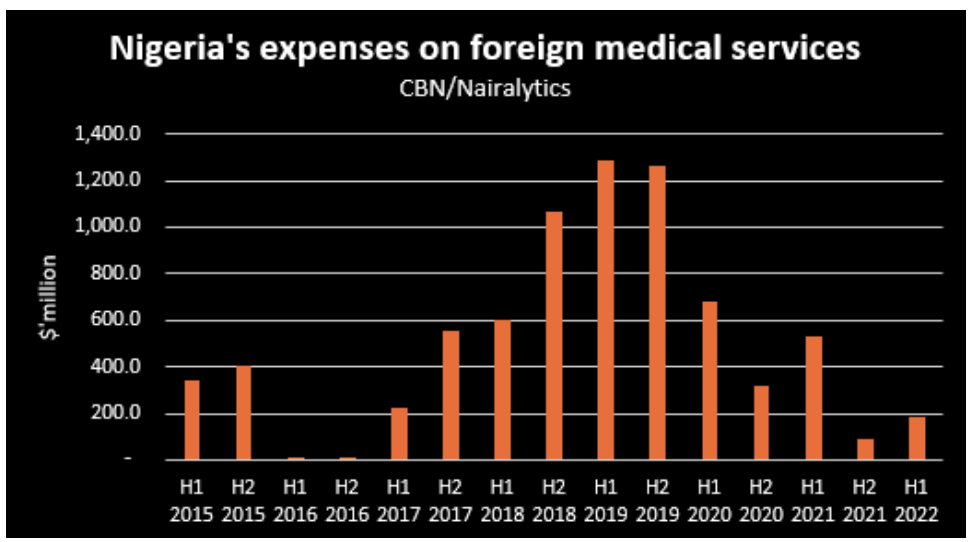Must Read

Nigerians spent a sum of $185 million on foreign (medical) health services in the first half of 2022, falling by 65% compared to $528 million recorded in the corresponding period of 2021.
This is according to data included in the country’s balance of payment breakdown, obtained from the Central Bank of Nigeria.
The balance of payment (BOP) breaks down the total amount of forex inflows and outflows in a country wherein a positive balance indicates a current account surplus and a negative current account deficit.
The $185 million stated, represents the total outflow of forex officially incurred for health services.
Breakdown of Spend on Healthcare Services
While the amount dropped compared to the corresponding period of 2021, it however increased by 113.1% compared to N86.9 million that was spent in the second half of last year.
- Nigerians’ spending on foreign medical services dropped significantly in 2020 in the heat of the pandemic, with travel restrictions being placed and the growing incidence of the disease in other developed countries.
- In 2020, Nigerians parted with a sum of $1 billion for foreign health-related expenses, from $2.6 billion recorded in 2019.
- It fell further to $615 million in 2021 and could reduce further in 2022. Meanwhile, Nigerians have had a knack for traveling abroad for medical services because of a lack of trust and the inadequacies in the Nigerian health sector.

Source: CBN/Nairalytics
Why the decline in healthcare spend
The covid-19 pandemic changed a whole lot of things that we would otherwise refer to as norms. From working, eating, travelling amongst others, the pattern has been affected, including Nigerians’ unsatiable demand for foreign services.
- While the numbers do not explicitly indicate the reason for the sudden crash, the decline happened during and after the covid-19 pandemic.
- Travelling outside the country, especially for healthcare-related reasons has declined due to travel restrictions and access to forex.
- Additionally, the rising cost of travelling abroad due to the naira devaluation and the global energy crisis has also discouraged foreign travelling, as the globe continues to grapple with the effect of the Russia-Ukraine war.
- Nigeria has also attracted a significant increase in new hospitals as millions of dollars in investments pour into the sector.
The human health sector of the country’s economy recorded a real GDP growth rate of 4.93%, 5.91 and 2.23 in 2021, Q1 2022, and Q2 2022 respectively.
Data Optics
In a previous Nairmetrics analysis of Nigeria’s foreign medical spending, the country spent a total of $11.01 billion on health-related services abroad in ten years, averaging $1 billion a year.
- This represents a significant chunk of dollar outflow despite the crunch in FX liquidity in the country.
- It is interesting to note that despite the huge outflow, the country, which is dubbed the giant of Africa and the largest economy on the continent received no FX inflows for the same purpose. An indication of how foreigners perceive the state of the Nigerian health sector.
- The Global Health Workforce Alliance of the World Health Organization had highlighted some key factors affecting the Nigerian healthcare service sector, some of which include lack of public and private sector coordination, lack of planning based on staffing projection needs, which leads to an overproduction of some categories of health workers at the expense of others.
Inadequate health sector allocation
A major concern in the Nigerian health sector has been an investment and government spending in the sector.
President Muhammadu Buhari allocated a sum of N1.09 trillion to the Nigerian health sector in the 2023 appropriation bill, an improvement from the N714 billion allocated in the previous budget.
This accounts for 5.4% of the total projected expenses for the year.
- Despite this improvement in terms of quantum, the Nigerian government is yet to level up in terms of global standards for the budget allocated to the health sector.
- The health sector is a critical sector of a country’s Sustainable Development Goals and requires that at least 15% of the annual budget be budgeted to the sector, according to the World Health Organization’s (WHO) benchmark.
- Compared to South Africa’s 11.9% allocation, Nigeria’s N1.09 trillion appears to still be low. Similarly, Nigeria’s health sector budget stood at N4,935 in 2023 appropriation on a per capita basis.
Bottom line
Despite the decline in foreign medical expenses, the underlying factors encouraging the huge capital flight continue to be the case and would require immediate attention as the continuous spending on imported services hampers the country’s balance of payment and by extension piles more pressure on the exchange rate.
The post Nigerians’ foreign medical spending crashes by 65% in first half of 2022 appeared first on Nairametrics.
-Picsart-AiImageEnhancer.jpeg.png)

